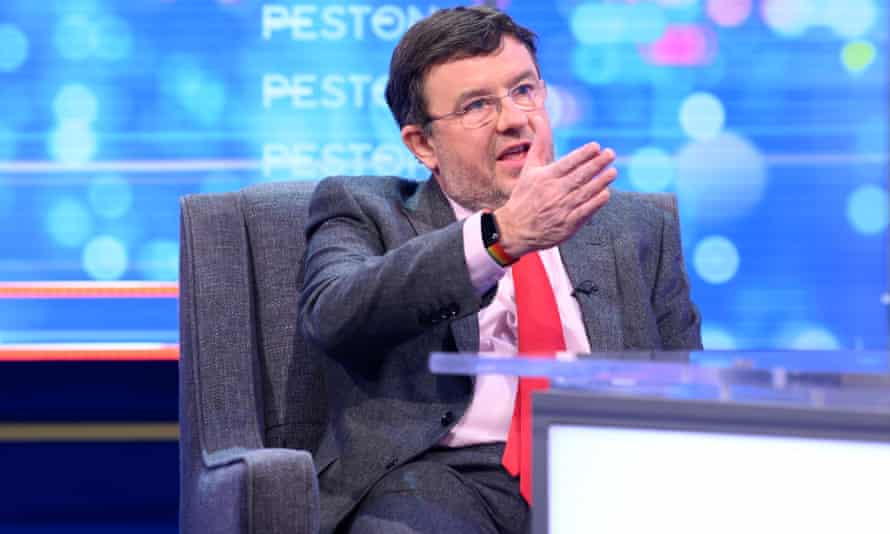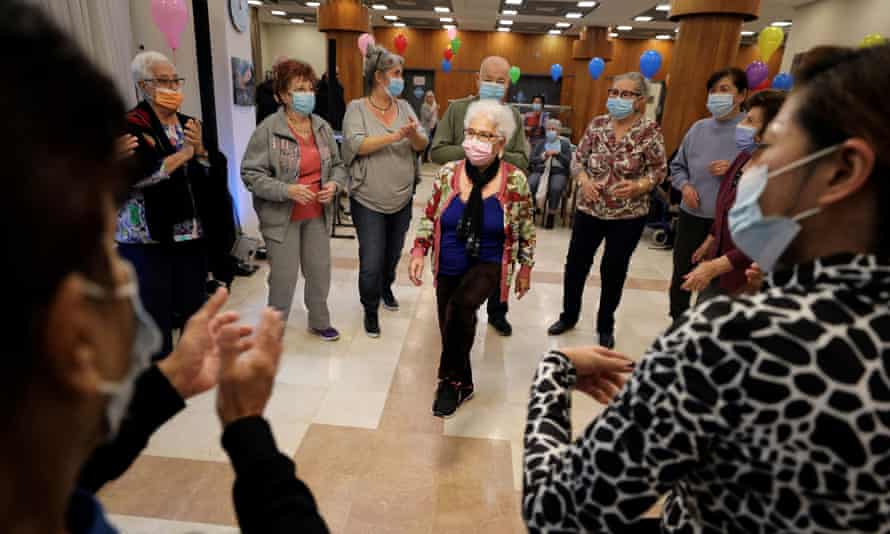
Covid should be treated as an endemic virus similar to flu, and ministers should end mass-vaccination after the booster campaign, the former chairman of the UK’s vaccine taskforce has said.
With health chiefs and senior Tories also lobbying for a post-pandemic plan for a straining NHS, Dr Clive Dix called for a major rethink of the UK’s Covid strategy, in effect reversing the approach of the past two years and returning to a “new normality”.
“We need to analyse whether we use the current booster campaign to ensure the vulnerable are protected, if this is seen to be necessary,” he said. “Mass population-based vaccination in the UK should now end.”
He said ministers should urgently back research into Covid immunity beyond antibodies to include B-cells and T-cells (white blood cells). This could help create vaccines for vulnerable people specific to Covid variants, he said, adding: “We now need to manage disease, not virus spread. So stopping progression to severe disease in vulnerable groups is the future objective.”
His intervention comes as it was revealed that more than 150,000 people across the UK have now died from Covid. Official figures published yesterday recorded a further 313 deaths, the highest daily number since February last year when the last peak was receding. It takes total recorded deaths within 28 days of a positive Covid test to 150,057. Boris Johnson, the prime minister, tweeted in response: “Coronavirus has taken a terrible toll on our country and today the number of deaths recorded has reached 150,000.
“Each and every one of those is a profound loss to the families, friends and communities affected and my thoughts and condolences are with them.
“Our way out of this pandemic is for everyone to get their booster or their first or second dose if they haven’t yet.”
Keir Starmer, the Labour leader, said the death toll was a “dark milestone for our country”. Daily infections fell to 146,390 yesterday.
NHS officials are warning that patient safety has been compromised this winter because of a crippling health and social care staff shortage that would require a million additional workers by the next decade. Writing in the Observer, Chris Hopson, chief executive of NHS Providers, said that the pandemic had exposed “its weakest links”.
“There is a clear, regrettable, impact on quality of care and, in the most pressured parts of the system, a worrying increase in patient safety risk,” he writes. “It is now very clear that the NHS and our social care system do not have sufficient capacity. That asking staff to work harder and harder to address that gap is simply not sustainable. That we need a long-term, fully funded, workforce plan to attract and retain the extra one million health and care staff the Health Foundation estimates will be needed by 2031.”

Jeremy Hunt, the former health secretary, also called for action, saying: “The pandemic has highlighted workforce pressures but they were never new. We can’t solve them overnight, but we have a moral duty to NHS and care staff to look them in the eye after the hell of the last two years and say a long-term plan is in place.”
Hopson said some NHS trusts outside London would see Covid hospitalisations rise even higher than their previous record peak last year.
“There are already a number of trusts whose Covid hospitalisation levels are at 100% of their January 2021 peak,” he said. “That’s before they are anywhere near their current peaks. These organisations are likely to be 10 days or two weeks away from their peak this time round.”
He also said he understood that as many as 40% of care homes had stopped taking new admissions in the past week, making it hard for hospitals to discharge patients. Stephen Chandler, president of the Association of Directors of Adult Social Services, said that social care was in a “national emergency” because so many staff were off sick.
A government spokesperson said “historic amounts of funding” were being provided for NHS backlogs and social care, adding: “Hospital admissions are rising, however this is not yet translating into the same numbers needing intensive care that we saw in previous waves. We’re increasing NHS capacity by building onsite Nightingale hubs, as well as creating 2,500 virtual beds where people can be safely treated at home.”
Dix’s remarks on ending mass-vaccination come as the Joint Committee on Vaccination and Immunisation (JCVI) ruled that fourth doses were not currently needed because most older people who had received boosters were still well-protected against Omicron, three months after the booster campaign began. The UK Health Security Agency said protection for over-65s was about 90%, three months after a booster jab. The JCVI’s deputy chair, Professor Anthony Harnden, said the committee was monitoring the impact of Omicron on older and vulnerable people on a weekly basis.

A debate is unfolding over fourth doses. Last week, Israel became the first country to embark on a fourth round of Covid vaccinations, for over-60s and healthcare workers who had their third jab at least three months ago. Greg Clark, the Tory chair of the Commons science and technology committee, said a fourth dose of vaccine should be considered for healthcare workers, adding: “The UK Health Security Agency found that the impact of a third dose against transmission of Covid wanes after 10 weeks. So, given the staff shortages in the NHS from self-isolation and the fact that NHS staff received their booster from mid September, it would be worth the JCVI considering whether a further dose would help reduce absences among frontline staff.”
Dix was instrumental in helping pharmaceutical firms create the Covid vaccines that have transformed the risk to most people. He said he supported the current booster campaign, but a “new targeted strategy” was needed to get the UK to a position of “managing Covid”. He added: “We should consider when we stop testing and let individuals isolate when they are not well and return to work when they feel ready, in the same way we do in a bad influenza season.”
Dix said the government should support research and analysis of how effective vaccines had been at producing “memory B- and T-cell immunity” – parts of the immune system that recognise Covid – and particularly how they worked for over-60s and vulnerable groups with underlying health conditions.
“With this data in hand, we should influence manufacturers who have vaccines that have shown the most durable cellular responses to develop an Omicron and a Delta variant vaccine to cover the current mutation lineages,” he said, adding that Prof Paul Moss and the Covid Immunology Consortium had provided “excellent groundwork” for this.
Professor Eleanor Riley, professor of immunology and infectious disease at the University of Edinburgh, said: “Everything depends on whether another variant comes up.
“A fourth dose or second booster of the existing vaccine probably isn’t going to achieve very much. The evidence is that immunity against severe disease is much longer lasting. The only justification for doing a second booster for the majority of the population would be if we saw clear evidence of people, five or six months after their booster, ending up in hospital with severe Covid.”
Health experts are also concerned that the take-up of the booster vaccine last month was driven by the public’s wish not disrupt their festive season. Now that fear has gone it has removed some of the drive to take up the vaccine. In addition there is a widespread perception that Omicron is milder and less worrying, added Simon Williams of Swansea University. “We call ‘variant fatigue’ which translates as people saying ‘this is what viruses do; we just need to get on with our lives.’ It’s not great from a public health perspective.”
However, child health expert, Professor Helen Bedford of University College London, warned that there was a danger in lumping diehard anti-vaxxers with people who have nagging doubts about getting a vaccine. “If you do that you will miss the chance to persuade those who have genuine concerns but who could change their minds and get vaccinated. It does not help to criticise them all as talking mumbo-jumbo.”